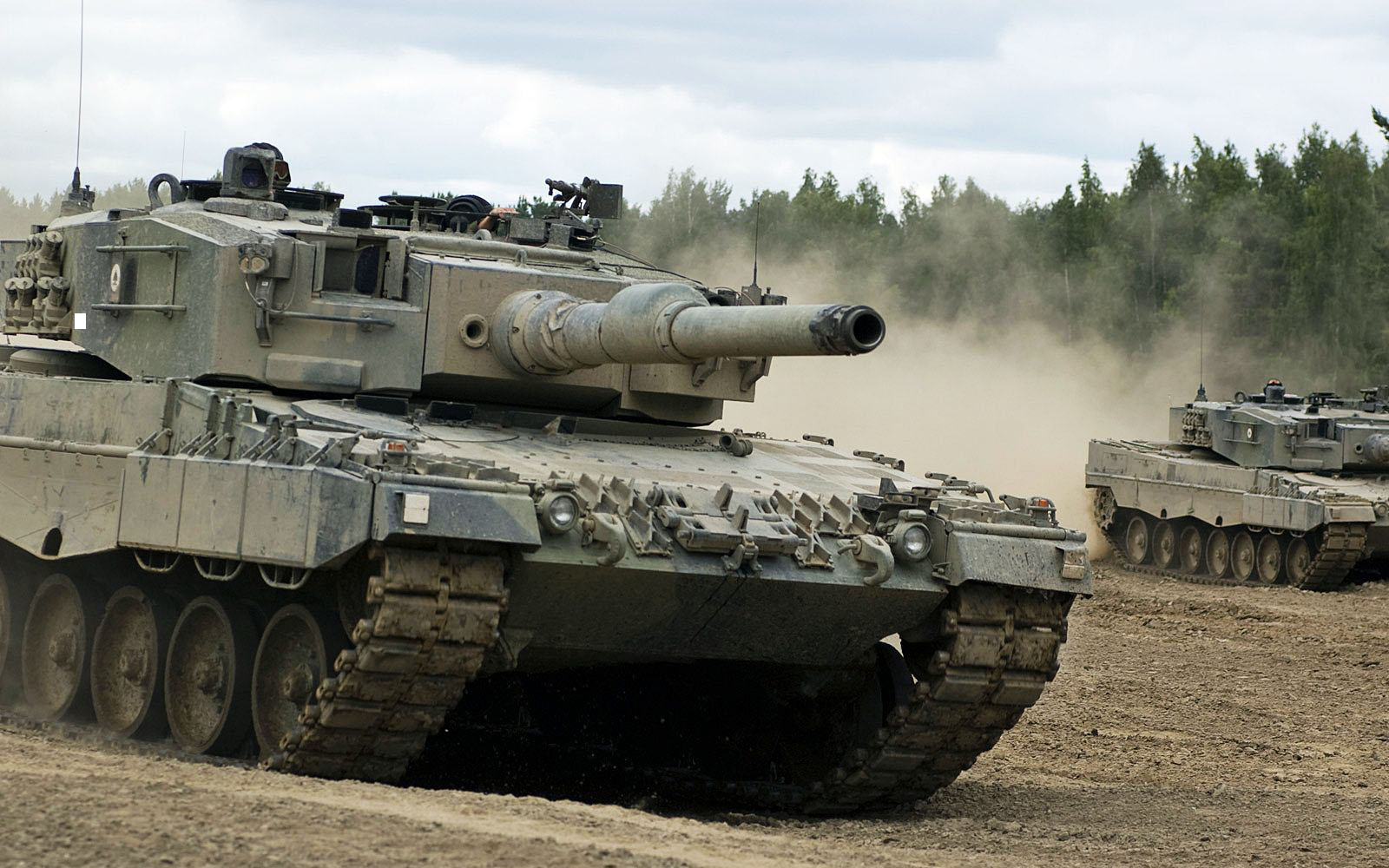In addition to supplying Ukraine with large volumes of armament, Germany has also attempted to entice other countries to send their heavy weaponry to Ukraine in a programme known as 'Ringtausch' (which roughly translates to 'circular exchange'). Under this policy,
countries can receive German armament free of charge in exchange for delivering tanks and infantry fighting vehicles (IFVs) from own stocks to Ukraine. Although this seemed a promising scheme at first, the 'Ringtausch' programme has largely
failed to live up to expectations as most countries expect to have their
Soviet-era systems replaced by larger numbers of modern weapon systems than what Berlin is currently able (or willing) to offer.
Just what exactly ''similar replacement systems'' entails has been at the heart of the relative lack of success of the 'Ringtausch' scheme. Germany has offered the Leopard 2A4 MBT to Czechia, Slovakia and Poland in exchange for these countries sending their T-72s to Ukraine. While superior to the MBTs they are replacing, Poland was offered just 20 Leopard 2A4s (and curiously, 100 Leopard 1A5s) instead of the 44 MBTs to equip a full tank battalion it was expecting. [1] [2] Germany would only deliver the first of the Leopard 2A4s in April 2023 at a rate of one MBT a month, increasing to three per month from October 2023. [1] Negotiations with Poland are still ungoing as of the writing of this article, undoubtedly much to Warsaw's displeasure, which has already dispatched more than 250 MBTs to Ukraine. [3]
A deal to supply Czechia with fourteen Leopard 2A4s and one Büffel armoured recovery vehicle (ARV) was only sealed on August 29, 2022, some four months after the country first supplied Ukraine with an unknown number of T-72M1s. [4] [5] As these T-72s came from reserve stocks, the 'Ringtausch' programme is perhaps more accurately described as a rewards programme rather than a scheme aimed at directly replacing lost capabilities beforehand. Slovakia is similarly set to receive 15
Leopard 2A4s along with a munitions, training, and logistic package in exchange for providing Ukraine with 30 BVP-1 IFVs taken from reserve stocks in what can only be described as an amazing deal for Slovakia. [6]
 |
A Leopard 2A4 (left) next to a T-72M1 (right). |
Greece has also ventured to join the 'Ringtausch' programme in what appears to have been an attempt at replacing its own inventory of
ageing IFVs at no cost. Greece had
originally acquired its BMP-1A1s from Germany in 1992 at a cost of 50.000
Deutschmark per vehicle (roughly €40.000 in 2021). After thirty years of intensive use with the Hellenic Army (after earlier being used for thirty years by the East German Army), the Greek government will have 40 of them replaced with an equal number of German-made Marder IFVs. [7] A 'Ringtausch' for Marder IFVs and Fuchs armoured personnel carriers (APCs) with Slovenia was first shelved in favour of speeding up the delivery of the 45 Boxer IFVs ordered by Slovenia in 2021 (a deal that was subsequently cancelled in September 2022), and then in favour of 45 MAN 8x8 military trucks for 28 M-55S MBTs. [8] [9] [10]
In retrospect, the 'Ringtausch' concept was perhaps doomed from the start by its own inherent contradictions. Those nations that were willing and able to give up their armoured vehicles to support Ukraine's plight would generally have moved to do so without the promise of a handful of fancy replacements, whereas those that actually needed a replacement capability before being able to do away with their weaponry would need such prohibitively expensive replacements that the whole venture would no longer be worth it. Still, Germany's commitment to this scheme was certainly preferable to a lack of commitment altogether, and shows that despite the focus on its apparent refusal to equip Uraine with heavy armament, the gears have been turning to try and find viable solutions to its supply problems.
In retrospect, the 'Ringtausch' concept was perhaps doomed from the start by its own inherent contradictions. Those nations that were willing and able to give up their armoured vehicles to support Ukraine's plight would generally have moved to do so without the promise of a handful of fancy replacements, whereas those that actually needed a replacement capability before being able to do away with their weaponry would need such prohibitively expensive replacements that the whole venture would no longer be worth it. Still, Germany's commitment to this scheme was certainly preferable to a lack of commitment altogether, and shows that despite the focus on its apparent refusal to equip Uraine with heavy armament, the gears have been turning to try and find viable solutions to its supply problems.
The
following list attempts to keep track of successful Ringtausch' exchanges. This list will be updated
as further deals are declared.
Czechia
 14 Leopard 2A4 MBTs and 1 Büffel ARV Exchanged For An Unspecified Number of T-72M1 MBTs
14 Leopard 2A4 MBTs and 1 Büffel ARV Exchanged For An Unspecified Number of T-72M1 MBTs
Greece
 40 Marder IFVs Exchanged For 40 BMP-1A1 IFVs
40 Marder IFVs Exchanged For 40 BMP-1A1 IFVs
Slovakia
 15 Leopard 2A4 MBTs Exchanged For 30 BVP-1 IFVs
15 Leopard 2A4 MBTs Exchanged For 30 BVP-1 IFVs
Slovenia
 45 MAN KAT1 Transport And Water Trucks Exchanged For 28 M-55S MBTs
45 MAN KAT1 Transport And Water Trucks Exchanged For 28 M-55S MBTs
[2] Ringtausch Fuer Ukraine: Polen Will Mehr Deutsche Panzer https://www.faz.net/agenturmeldungen/dpa/ringtausch-fuer-ukraine-polen-will-mehr-deutsche-panzer-18194752.html
[3] A European Powerhouse: Polish Military Aid To Ukraine https://www.oryxspioenkop.com/2022/08/a-european-powerhouse-polish-military.html
[5] Answering The Call: Heavy Weaponry Supplied To Ukraine https://www.oryxspioenkop.com/2022/04/answering-call-heavy-weaponry-supplied.html
[7] BMP-1A1 Ost in Greek Service https://tanks-encyclopedia.com/bmp-1-greece/
[8] Slovenia and Germany Expedite Delivery of BVP M-80 to Ukraine https://en.defence-ua.com/news/slovenia_and_germany_expedite_delivery_of_bvp_m_80_to_ukraine-3558.html
[9] Slovenia will leave the Boxer programme https://www.shephardmedia.com/news/landwarfareintl/slovenia-leaves-the-boxer-programme/
[10] Weiterer Ringtausch: Ministerin vereinbart Letter of Intent mit Slowenien https://www.bmvg.de/de/aktuelles/ringtausch-ministerin-vereinbart-letter-of-intent-mit-slowenien-5501446

.png)





